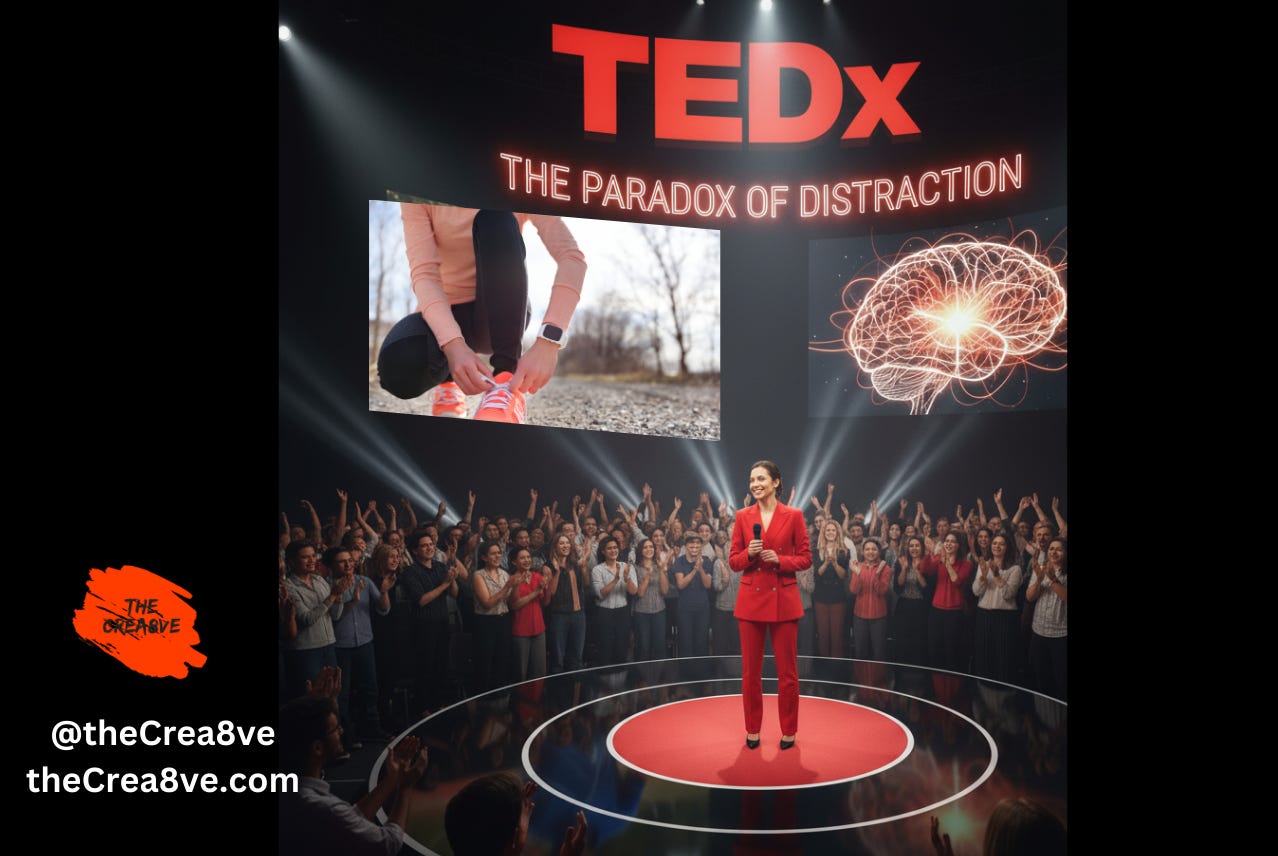👆Listen above or 👇 watch below
I want you to imagine, for a moment, a bright, scorching afternoon. The kind where the air feels thick, and every breath is an effort. I was out on the track, doing my usual run, and honestly? It was brutal. My legs were heavy, my lungs burned, and every fiber of my being wanted to just... stop. I was consciously counting the laps, feeling every painful step.
It was hot. I was tired. I know what this feels like because my head, legs and body hurts when I run. Because I’m not an athlete. It was muggy, flies, gnats and lots of people around me.
Then, my phone rang. It was my dad from Australia. And without really thinking, I answered. We started talking about his day, about his new house, and moving. And we talked about how he couldn’t find one of the boxes and we laughed about that. “Oh it’ll turn up soon, Dad” (and it did a day later, but anyway.. back to the topic)
And as we talked, something extraordinary happened.
I kept running.
I wasn’t thinking about my legs anymore. I wasn’t thinking about the heat. I wasn’t even thinking about the laps. I was just running and talking. And before I knew it, my dad said, ‘Well, I should let you go, you must be exhausted from your run.’ And I looked up, genuinely surprised... I had finished. Not just finished, but I’d run 8 laps (my average is 2), and I barely remembered doing it.
I had never been less focused on running, yet I had never run better.
Challenging Conventional Wisdom
This experience sparked a question in my mind, one that goes against almost everything we’re taught about success and achievement: What if, sometimes, to achieve our deepest focus and perform at our peak, we actually need to be… distracted?
We live in a world obsessed with focus. ‘Eliminate distractions!’ ‘Single-task!’ ‘Deep work!’ And for good reason, often. But I believe there’s a powerful, often misunderstood paradox at play. A paradox where a well-placed ‘distraction’ isn’t a detractor, but a catalyst.
Flow States and Cognitive Offloading
So, what happened to me on that track? It wasn’t magic, it was something psychologists call a ‘flow state.’
It’s that feeling of being completely immersed in an activity, where time seems to disappear, and you feel effortless, almost one with what you’re doing.
Normally, when we’re facing a difficult task, like running that felt grueling, our conscious mind kicks in. It’s the voice saying, ‘This is hard. You’re tired. How much longer?’ It’s a vigilant gatekeeper, and sometimes, it can be our own worst enemy.
So, when I started talking to my dad, my brain engaged in a different kind of ‘work.’ The conversation demanded my attention. It was a fascinating, emotionally engaging task. My conscious mind shifted its primary focus from the physical discomfort of running to the mental processing of our chat.
This is what is called ‘Cognitive Offloading’ (or sometimes known as ‘Mental Redirect’). My primary brain resource, the one agonizing over the running, was suddenly redirected to the conversation. And what happened to the running? It moved to a more automatic, subconscious level. My body just… did it. Without the constant mental interference, without the internal resistance. The ‘distraction’ of the conversation provided just enough cognitive load to bypass the mental block.
Think of it like this: If you’re trying to push a heavy box, and you keep thinking about how heavy it is, it feels heavier. But if someone asks you a complex question while you’re pushing, your mind is momentarily diverted, and your body might just push with less perceived effort. The secondary task became my brain’s primary focus, freeing my body to excel at the primary physical task.
Where Else This Applies
This isn’t just about running. This paradox of distraction shows up in so many unexpected areas of our lives.
How many of you have had your best ideas not while staring intensely at a whiteboard, but while in the shower? Or on a long walk? Or listening to music on your commute?
I remember when I was about 13 or 14 years old. I couldn’t do my homework alone, in my room, at my perfectly organized, quiet desk. I needed stimulation. I needed to be in the dining room, my homework sprawled out on the dining table; TV on, radio on, family chatting… With all that stimuli I felt able to accomplish my homework (and might I add, I was pretty much an A student).
When our mind isn’t hyper-focused on trying to solve a problem, when it’s gently ‘distracted’ by a mundane or pleasant secondary activity, our subconscious can make novel connections, leading to breakthroughs. The ‘distraction’ allows for a mental wander, which can be the birthplace of innovation.
Or consider listening to music while studying, like I had to do as a teenager, or a podcast while doing chores. For some, complete silence is key. But for others, a low-level, engaging background ‘distraction’ helps. It’s not necessarily making the primary task more interesting, but it’s occupying the part of your brain that might otherwise wander to anxieties, boredom, or more intrusive distractions. It creates a stable, consistent hum that allows the deeper focus to emerge.
Sometimes, when a task feels overwhelmingly difficult, the very act of intensely focusing on its difficulty becomes a barrier. A small, unrelated ‘distraction’ can be the gentle push we need to just start. It lowers the perceived mental hurdle.
This Isn’t an Excuse for Bad Multitasking
Now, let me be clear. I am not advocating for mindless multitasking. I am not saying you should text and drive, or try to write a novel while having a complex work meeting. That’s a recipe for disaster. Definitely don’t tell your boss I told you to watch Tik Tok at work!
The key is understanding the quality and intensity of the distraction. A truly effective ‘distraction’ in this context is:
Engaging enough to capture your active, conscious mind.
Separate enough from the primary task that it doesn’t directly interfere with the core mechanics.
Low stakes if you briefly dip out of it. My conversation with my dad was engaging, separate from running mechanics, and it didn’t matter if I missed a sentence or two while dodging a puddle.
It’s about finding that sweet spot where the secondary activity frees up your primary focus, rather than fragmenting it. It’s about redirecting your mental gatekeeper, not overwhelming it.
WHERE DO YOU COME IN?
I invite you to rethink Your relationship with Focus
So, what does this mean for you? It means we need to challenge our rigid definitions of ‘focus’ and ‘distraction.’ It means we need to be more mindful, and perhaps even more playful, with how our brains work.
→ Next time you’re stuck, next time a task feels insurmountable, or next time you’re simply trying to perform your best, ask yourself: ‘Is there a strategic, engaging ‘distraction’ that could actually unlock my hidden potential?’
Maybe it’s a specific type of music while you’re tackling a mundane report. Maybe it’s a walk with a friend when you’re creatively blocked. Maybe it’s just a genuine, heartfelt conversation during your next challenging workout.
The Power of the Redirection
Because sometimes, the greatest path to peak performance isn’t through relentless, white-knuckled focus. Sometimes, it’s through the elegant redirection of our minds, allowing our true capabilities to emerge, undistracted by our own internal resistance.
To your next distraction, um, success…
xo,
Gilli
P.S. As for me, I’ll just continue to distract myself till I picture myself doing this:
Want more?











